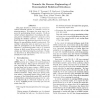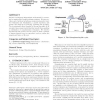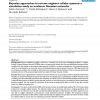42 search results - page 2 / 9 » Fuzzy Extensions for Reverse Engineering Repository Models |
SAC
1998
ACM
13 years 8 months ago
1998
ACM
Fuzzy Logic has traditionally found an application in control theory, systems analysis, and artificial intelligence [9] [7]. However, it is very difficult to apply it to tradition...
ICDE
1996
IEEE
14 years 6 months ago
1996
IEEE
This paper describes a method to cope with denormalized relational schemas in a database reverse engineering process. We propose two main steps to irnprove the understanding of da...
SIGSOFT
2005
ACM
14 years 5 months ago
2005
ACM
Moose is a language-independent environment for reverseand re-engineering complex software systems. Moose provides a set of services including a common meta-model, metrics evaluat...
WCRE
2002
IEEE
13 years 9 months ago
2002
IEEE
Today, software-engineering research and industry alike recognize the need for practical tools to support reverseengineering activities. Most of the well-known CASE tools support ...
BMCBI
2007
13 years 4 months ago
2007
Background: Reverse engineering cellular networks is currently one of the most challenging problems in systems biology. Dynamic Bayesian networks (DBNs) seem to be particularly su...



